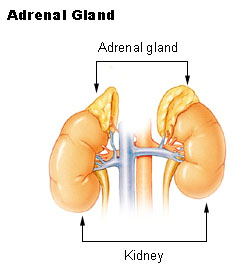Adrenal Gland

The adrenal, or suprarenal, gland is paired with one gland located near the upper portion of each kidney. Each gland is divided into an outer cortex and an inner medulla. The cortex and medulla of the adrenal gland, like the anterior and posterior lobes of the pituitary, develop from different embryonic tissues and secrete different hormones. The adrenal cortex is essential to life, but the medulla may be removed with no life-threatening effects.
The hypothalamus of the brain influences both portions of the adrenal gland but by different mechanisms. The adrenal cortex is regulated by negative feedback involving the hypothalamus and adrenocorticotropic hormone; the medulla is regulated by nerve impulses from the hypothalamus.
Hormones of the Adrenal Cortex
The adrenal cortex consists of three different regions, with each region producing a different group or type of hormones. Chemically, all the cortical hormones are steroid.
Mineralocorticoids are secreted by the outermost region of the adrenal cortex. The principal mineralocorticoid is aldosterone, which acts to conserve sodium ions and water in the body. Glucocorticoids are secreted by the middle region of the adrenal cortex. The principal glucocorticoid is cortisol, which increases blood glucose levels.
The third group of steroids secreted by the adrenal cortex is the gonadocorticoids, or sex hormones. These are secreted by the innermost region. Male hormones, androgens, and female hormones, estrogens, are secreted in minimal amounts in both sexes by the adrenal cortex, but their effect is usually masked by the hormones from the testes and ovaries. In females, the masculinization effect of androgen secretion may become evident after menopause, when estrogen levels from the ovaries decrease.
Hormones of the Adrenal Medulla
The adrenal medulla develops from neural tissue and secretes two hormones, epinephrine and norepinephrine. These two hormones are secreted in response to stimulation by sympathetic nerve, particularly during stressful situations. A lack of hormones from the adrenal medulla produces no significant effects. Hypersecretion, usually from a tumor, causes prolonged or continual sympathetic responses.
Suggested Citation
SEER Training Modules: Adrenal Gland. U.S. National Institutes of Health, National Cancer Institute. Cited 17 February 2026. Available from: https://training.seer.cancer.gov.




